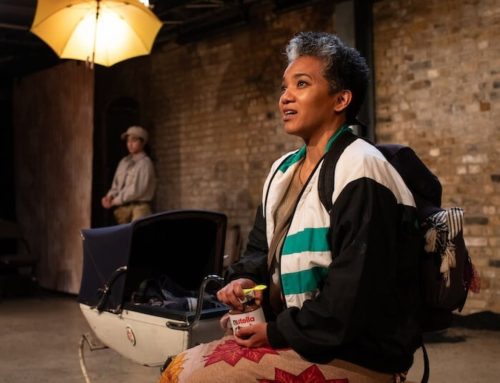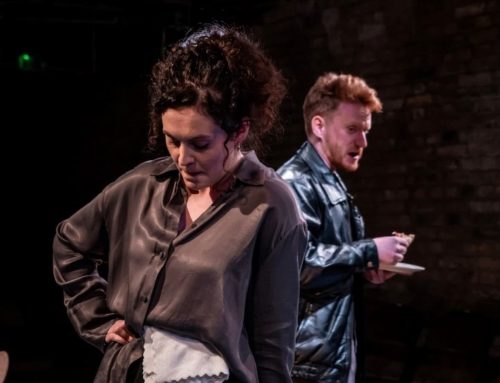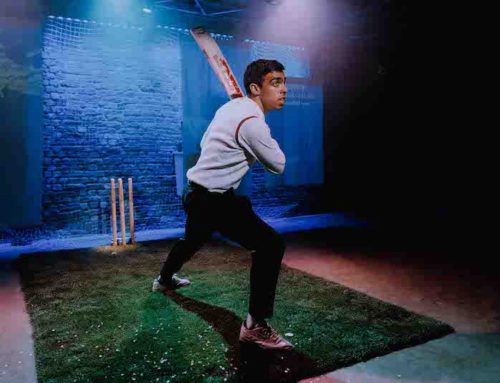The severe, hard-drinking matriarch of the immigrant Yeung family has recently passed away from what grandson Anthony breezily labels “diabetes-related shit”. In preparation for the funeral, her four first-generation offspring gather together for the first time in 18 years. Aside from saying goodbye to the distinctly unmourned Ah Ma, what presses on their minds most is their inheritance. Or rather lack thereof, as it soon transpires there is only £44 left in mum’s bank account and her home is being repossessed. The quartet of much miffed and variously mismatched siblings soon work out there must be £20,000 in cash hidden somewhere in the house.
There is two hours left until Ah Ma’s funeral and the search is on. But where can they find the money and who will take the lion’s share? Just as importantly, if they take her bucks will it absolve mum of the litany of child abuse she perpetrated in her younger days? Dark family secrets and barely concealed sibling rivalries soon emerge in Joanne Lau’s pitch-black comedy Worth, a show that occasionally makes its point a little too obviously but fizzles with tension all the same. Think a kind of poor man’s migrant version of TV’s blockbuster hit Succession.
Drug-dealer and ex-convict Jacob (Arthur Lee) is the “great white shark” of the Yeung siblings. Being the eldest son in a traditional Chinese family he believes himself most worthy of respect. Therefore, he concludes, he is due most of the cash. His siblings have other ideas. To them, recompense goes to those who suffered most at the hands of psycho mum. Younger brother Ted (Stephen Hoo) is a successful dentist with a big house and beautiful wife, but it is the regular beatings he suffered as a child that he thinks merits him the money. “It’s child abuse if you’re British; for immigrants the same rules don’t apply” is his take on mother’s parenting style. Warm-hearted Penny (Jennifer Lim) was whipped with extension cables, so she demands her fair share. Baby sister and born again evangelical pastor May (Sara Chia-Jewell) got knocked out with a chair and had her hands caned at piano practice; surely that is worth a pound or two, she opines. Only grandson Anthony (Leo Buckley) has fond memories of grandma. There are more photos of him than anyone else on the sideboard, something which irks his status-conscious uncles and aunt no end.
At one level Worth is a caustic satire on attitudes to hierarchy and status in some of Britain’s East and South East Asian immigrant families. “They want you to be happy, but not that happy” says one of the siblings, the implication being that what matters most is what you are worth. “Why did we put up with it?” asks another. Because that is what is expected of them being the single possible answer. The only inheritance of any value Ah Ma leaves her children is cash and bitter memories, but what is money really worth if it is so tainted? The bigger theme at issue here is the trade-off between love, happiness, and material success in bringing up children. It is a not uniquely an immigrant concern. Lau also has a stark point to make about how brutal parents breed brutalised children.
Tense and often very funny chaos unfolds as the bickering, competitive, quartet chafe against each other in their search of the house. The action, in which the characters have to do a few unlikely things in order for the story to progress, is overseen by a gilt-framed portrait of a smiling Ah Ma. She is an ever-present figure, haunting the scene like Banquo’s ghost. In case you do not get the point director Mingyu Lin replaces the portrait in the second half with one three times the size. It is a bit of redundant over-explaining that suggests Lin is worried her audience might miss the metaphor, and it is not the only one. “I’m nothing” is Teddy’s repeated assessment of his worth close to the end, a conclusion the audience is quite capable of making on its own. It would be helpful if Lin and Lau leave the audience a little more work to do in figuring out who these people are.
Nicola T Chang’s sound design, a low mechanical hum interrupted by persistent percussive beats, adds tension in just the right places. Leo Buckley has the best comic lines as the stroppy teen Anthony, whose look of bewilderment turns to horror as the elder generation begin to devour each other. Stephen Hoo impresses too as the flustered, jittery, dentist who cannot quite get anyone to give him the respect he thinks he deserves.
Writer: Joanne Lau
Director: Mingyu Lin
More Recent Reviews
Milked. White Bear Theatre.
Written in 2013 and first seen a decade ago in a production at the Soho Theatre, Simon Longman’s slice [...]
Fresh Mountain Air. Drayton Arms Theatre.
Lana Del Rey’s ode to female unity and resilience, God Bless America And All the Beautiful Women In It, [...]
Rodney Black: Who Cares? It’s Working. Lion and Unicorn Theatre.
Rodney Black is a tacky small-time comedian with a venal manager and a taste for nasty misogynism. “I’m a [...]






